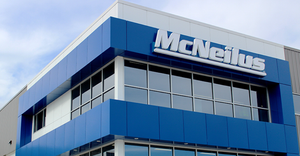DECONSTRUCTION: Seattle Struts Its Construction Recycling Stuff
November 1, 2001
Kim A. O'Connell
Only one city is synonymous with Starbucks, Microsoft, Boeing and Amazon.com — Seattle. In the past decade, the home of the Space Needle has experienced a 10 percent population increase, which has resulted in more jobs, offices and construction. Accordingly, Seattle's King County has seen a surge in construction waste that comprises 20 percent to 30 percent of the waste stream.
To handle burgeoning construction waste, King County has established a comprehensive construction recycling program — saving the region's builders thousands of dollars.
As other markets have ebbed and flowed, the local recycling market for construction and salvage debris has remained fairly steady. High demand exists for salvaged concrete, asphalt, brick and rock, lumber, timber, and architectural features such as staircases and moldings. The Seattle region has a strong private-sector infrastructure for this type of recycling, and approximately 30 percent to 40 percent of construction debris is recycled.
Although this rate is relatively high, the county is aiming to increase construction recycling through its construction, demolition and landclearing (CDL) program, which focuses on teaching the building industry about recycling and reusing construction materials. Since 1993, the CDL program has grown from one part-time employee offering limited technical assistance to two full-time employees offering full technical assistance.
Program employees identify upcoming projects that could generate substantial construction waste, contact developers and work with each company to develop a waste management plan. The county also responds to public inquiries and maintains a searchable online database of recyclers and specific materials. Lastly, the county distributes regular publications and how-to guides that include technical language to incorporate recycling into construction contracts.
The county has found that the most successful way to encourage recycling is to sell builders on the economic benefits. In King County, the cost to dump construction materials is about $85 per ton, whereas recycling costs $55 per ton or less and is sometimes even free.
The overall success of construction recycling hinges on two factors, says Theresa Koppang, manager of the King County Green Building Program. “Recycling must remain voluntary rather than mandatory, and the marketplace must determine the economic viability of recycling without direct subsidies from King County government,” Koppang says. “The CDL program staff focuses on creating and exploiting incentives for construction companies to recycle their waste and to build with salvaged and recycled-content materials.”
One concern that developers often have is that recycling will require time-consuming and costly separation of material to be sent for processing. Koppang argues that several companies have found that the cost savings from recycling far outweigh any increase in labor costs. For example, one Seattle-based contractor, H.S. Wright, was tasked with remodeling the Microsoft Data Center in Bothell, Wash., on a tight six-month deadline. The contractor found that the construction project had distinct phases where single types of waste, such as concrete or wood, could be sorted easily. This nearly eliminated the time spent sorting the material. In all, more than 1,200 tons of debris were recycled, saving more than $195,000 in the construction and demolition phases.
“Recycling is the last thing on your mind when you're under the gun,” says Madalyn Rustagi, project engineer with H.S. Wright. “But when we broke down the project into chunks, we realized, ‘Hey, we can do this.’”
Several other developers have taken advantage of the program as well, such as Seattle-based Sellen Construction. Sellen contracted for work on Microsoft Pebble Beach in Redmond, Wash., and recycled 74 percent of its waste and saved $186,000. Hensel Phelps, Greeley, Colo., recycled 61 percent of the debris generated by the King County Regional Justice Center in Kent, Wash., saving $242,630.
To offer further guidance and inspiration, the county has compiled a report entitled, “Construction and Demolition Recycling: The King County Experience,” which details further case studies. Additionally, other helpful information can be found in the “Seattle/King County Construction Recycling Directory.” Produced yearly, the directory walks customers through the process of setting up a construction recycling program and includes detailed lists of area recyclers, broken down by material.
One of the directory's case studies centers on Seattle-based Baugh Construction, which recycled 94 percent of the waste from its Boeing Commercial Airplane Group Headquarters project in Renton, Wash. The company recovered more than 6,400 tons of concrete, 64 tons of wood and 39 tons of metals. Furthermore, the company also used wood paneling harvested from sustainable forests, parking lot curbs and pathways made from recycled plastic, and lobby countertops made of recycled paper. In all, Baugh saved about $90,000.
In another example, the King County Department of Construction and Facilities Management teamed with developer Wright Runstad and contractor Lease Crutcher Lewis, all Seattle based, to build the King Street Center, one of the largest sustainable buildings on the West Coast. Eighty percent of construction materials were recycled, including more than 3,800 tons of concrete, 668 tons of granite and 136 tons of wood.
Koppang says that one of the county's biggest challenges is keeping the directory up to date. It also can be a challenge to design educational workshops that attract project managers and site superintendents, she says.
“These folks are so incredibly busy that, as much as they care about job-site recycling, it can be difficult for them to get away and find the time to attend a seminar or workshop on how to make a program work,” she says. “We've been fortunate in this case because we learned early on the value of partnering with large firms and the trade organizations to join forces and offer education together.”
The CDL program is just one part of a multi-pronged effort in the county to increase recycling and reduce waste. The county also maintains an online materials exchange, matching generators of reusable building materials with potential users. The exchange is accessible at www.metrokc.gov/rbme.
The Construction Recycling Directory can be found at dnr.metrokc.gov/swd/bizprog/sus_build/CDLguide.pdf. For further information, e-mail [email protected].
Project | Cost Savings | Recycling Rate | Tons Recycled |
|---|---|---|---|
Washington Residence SalvageMercer Island, Wash.Earthwise Inc. | $38,443 | 60% | 373 |
Microsoft Pebble BeachRedmond, Wash.Sellen Construction | $186,000 | 74% | 2,310 |
Klahanie DevelopmentIssaquah, Wash.Lozier Homes | $14,736 | 55% | 133 |
Kentlake High SchoolKent, Wash.Crutcher Lewis | $16,500 | 60% | 664 |
King Co. Regional Justice CenterKent, Wash.Hensel Phelps | $242,630 | 61% | 2,730 |
You May Also Like


